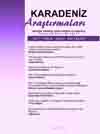Turkish Foreign Policy toward the Bosnian War (1992-1995): A Constructivist Analysis
Turkish Foreign Policy toward the Bosnian War (1992-1995): A Constructivist Analysis
Author(s): Birgül Demirtaş-CoşkunSubject(s): Politics / Political Sciences
Published by: Karadeniz Araştırmaları Merkezi
Keywords: Turkey; Bosnia; Balkans; foreign policy; state identity
Summary/Abstract: The main aim of this essay is to examine the policy adopted by Turkish decision makers toward the Bosnian War between 1992 and 1995. The puzzling question is that why Turkey attempted to play an active role during the war in Bosnia in spite of its internal and external problems at the time. This study argues that the search for a new state identity in the post-Cold War era provided the key to understand Turkish foreign policy towards the Bosnian conflict. It is argued that by developing an active attitude toward the conflict, Ankara was in fact trying to reformulate its former identity, which had been constructed during the Cold War. Turkey was trying to prove that it was still important for Western security in the new era. The study shows that the wars of Yugoslav dissolution witnessed many speeches of Turkish leaders declaring the greatness of the country. This dominant discourse was accompanied by an active foreign policy by the Turkish leaders. At the time Ankara started many diplomatic initiatives to bring the Bosnian issue to the attention of the international community. This study argues that the discourse and foreign policy during the Bosnian War were caused by Turkish leaders’ desire to show Turkey’s still lasting geopolitical signifance to the world.
Journal: Karadeniz Araştırmaları
- Issue Year: 2011
- Issue No: 28
- Page Range: 1-18
- Page Count: 18
- Language: English

